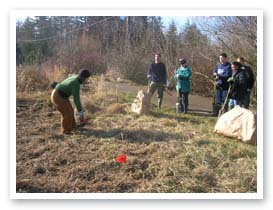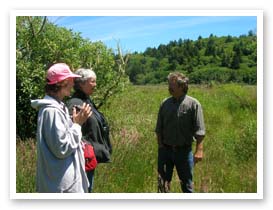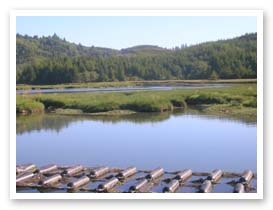 INSTITUTE FOR NATURAL RESOURCES
INSTITUTE FOR NATURAL RESOURCESYou are here
Wetlands
- Intro
- Planning Resources
- Research Projects
- Articles & Stories
- Maps & Tools
- Reports & Publications
- Data
- Photos & Videos
- More
The Value of Wetlands
Wetland values are the goods and benefits that wetlands provide to human society. While we don't always take the time to list these benefits, they are irreplaceable. The interaction between wetland values and ecological services and functions is complex. Finding a balance between supporting wetlands for their specific values and protecting all ecological services and functions is difficult. Listed below are major societal benefits of wetlands.
Wetlands Provide...
Education and Research. In wetlands, school children and community groups are able to personally investigate the workings of complex ecosystems. Wetlands with public access and intact habitat provide excellent educational opportunities or "wetland classrooms." Wetlands are also outdoor laboratories for researchers, and general scientific knowledge has been greatly enhanced by studies on the functions of wetlands. Many values, responses, functions, and stressors of wetlands are not fully explored or understood. Further research will help the assessment of wetland threats and direct mitigation, and conservation.

Open Meadow Learning Center students use The Cedar
Mill Preserve as an outdoor classroom; Beaverton, Oregon
(Esther Lev, The Wetlands Conservancy)

Birding at the New Oregon state Parks and Recreation
Beaver Creek Natural Area; Seal Rock, Oregon
(Esther Lev, The Wetlands Conservancy)
Recreation and Sport. Wetlands provide Oregonians with dozens of recreational opportunities, from duck hunting to bird watching, photography, and kayaking.
Commodities. Through their role as powerhouses of biological productivity, wetlands provide large volumes of fish, shellfish, timber, fruits, peat, plants and flowers for the nursery and floral trades, and other natural products that we use. Wetlands are not inexhaustible resources, and the key to their use by humans is to take all products in moderation.

Oyster racks at McCaffery Slough; Newport, Oregon
(Esther Lev, The Wetlands Conservancy)
Learn more about wetlands at The Wetlands Conservancy web site.











